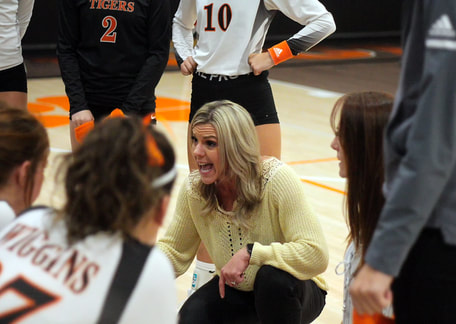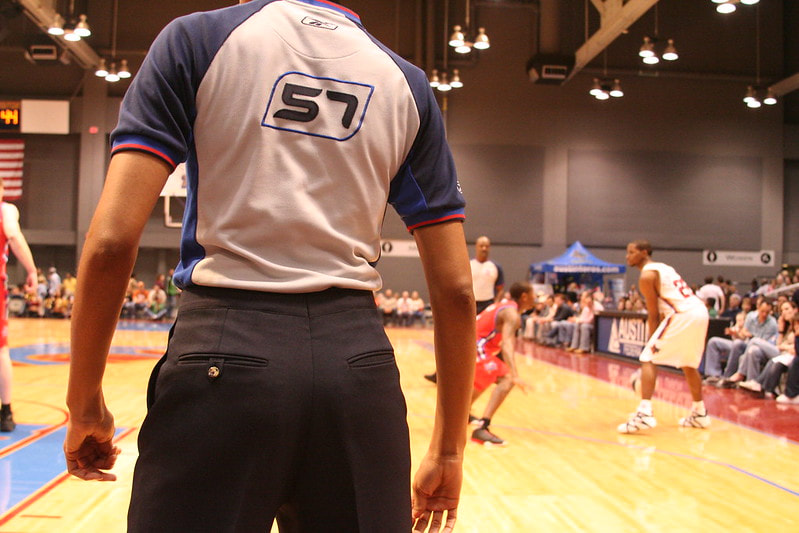Bridging Leadership Lessons from the Workplace and Those Experiences Shaping Today's Youth and Tomorrow's Leaders
 Last time, I wrote about holding your player accountable and was able to show how I used a moment to not only teach my son, but an opposing player, about on court behavior. When you are coaching your child, you tend to use them as your example more often than not. Coaching my middle son’s team was more of a challenge in that they were a team of solid players, but we didn’t consistently have kids that could take over games as our speed and athleticism were not very good when they were young. Because of this, we struggled defensively to guard the ball and spent much of our time helping our teammates which would lead to a breakdown. I refused to play a zone defense as my objective was not to win, but to develop and I felt reinforcing the principles of a man-to-man defense was the best way to do that. In the end, the struggles and learning by improving their defensive positioning and technique would help them when they reached high school and used different defensive schemes. There was a team we struggled to beat that had a very good player who happened to be the coach’s son. When games were close, their offense was to run a pick and roll so he could score. I understand this approach and if I was getting paid or playing for a State Championship or an NCAA playoff berth, well, I would have done the same thing. But this was youth basketball for our school team. My focus was on the development of ALL the players more than it was the win. If I would have switched to a zone or a gimmick defense like a box and one, we could have shut him down and greatly improved our chances for a win. But, when you are charged with the development of people, you must keep things in perspective. In this case, winning a 6th grade tournament was not as important to me as the players growing and understanding how to work together as a team. Our team was doing well and worked hard to slow the player down and because of our team working together on defense, we were able to slow the player down and maintain a lead. What I failed to mention as I set this up, is that the player, who was extremely talented, had a tendency to let his emotions get the best of him when things didn’t go his way. The coach had a similar personality. The kid was a heck of a player and a very friendly kid away from the court, but his competitive nature would get the best of him and his actions on the court would sometimes detract from his play. As it was a tightly contested game, the opposing coach was working hard on the referees and his frustration was mounting as his best player was losing control and his team could not quite close the distance. Listening to this added to my own stress as the game was winding down and we were nursing a small lead. I was hoping the referees might step in and address the complaining, but they chose not to, which led to the next teaching moment. My son had a foul called on him and he looked at the referee and threw his hands up in the air which looked to be in frustration. Now my son, at that time in his life, never complained and was very in control. I jumped up and proceeded to rip my son in front of the entire gym for complaining to the referee and trying to show him up. I went as far as to call a timeout, so that I could even more dramatically make my point. I reinforced that good players don’t behave that way. That he must be above such things and to be a person of character and respect. To fully make my point, I benched him for the rest of the game. I kneeled next to him on the bench and apologized for what I did and explained that I had to make a point to the other team about their behavior. I asked if he understood. He said yes. But I’m sure it didn’t make it any easier. Yes, we lost the game. The referee pulled me aside and said, “Coach, I don’t think he was trying to show me up. He was simply frustrated with himself for fouling.” I looked at him and said, “I agree, but I needed to make a point to that team.” He looked at me, smiled and walked off. The next week, we faced the same team, at their home tournament in the championship game. Before the game, the coach walked up to me and said “I heard what you were saying to your son. I have the same issue with my son. Would you mind talking with him?” Holy cow!!!! I couldn’t believe it. So, I talked to the kid. About how good of a player he is and how his frustration and complaining takes away from not only what he does on the court, but how he responds to challenges. We talked about whether he does the same thing off the court, and he admitted his behavior is the same at home or in the classroom. He struggles when things don't go his way. We talked about what he could do differently and how that could change his relationship with others. Specifically, his relationship with himself and how he views his own success. The kid went on to have a great career and always would come and find me at any tournament or game we would see him, throughout his high school career. Oh, and by the way, we won that tournament game. At the time, I felt these approaches were the right way to handle things. I saw a problem and while I could not directly fix the problem as I didn’t have the authority (not my player or parent) I felt I did have the chance to influence the situation. So, while it wasn’t in my Circle of Control, it was in my Circle of Influence. In hindsight, I realize that my intention of doing good resulted in someone having to bear the brunt of my fury and suffer through public embarrassment. In most situations like this, right or wrong, you seem to lash out at those you are closest to. Loved ones, friends, your best player, or your trusted employee. My mentor was giving me advice one day and suggested that when we are giving advice, we should always ask ourselves “are my words Helpful or Harmful?” In this example, I thought I was being helpful, justifying to myself the goodness of my intentions. But in the end, if you are tearing down without building up, then for that individual it is harmful, even if they understand. Building up others and not tearing them down is how you build Beyond Today.
0 Comments
 Photo by Donald Dodd Photo by Donald Dodd A trait that I have picked up in 30+ years of coaching sports, is the opportunity to indirectly coach players who are not on my team. It could be the players on the other team, the opposing coaches, the parents of my players, the referees or the obnoxious fan that doesn’t quite understand the game. I admit, this trait is probably extremely annoying if you are on the receiving end of my coaching, but what I have found is that most of my targets don’t understand that I am specifically talking to them. Most of the time, it probably never sinks in but in some cases, it will cause them to think and reflect. Maybe not immediately, but later when they think back or come into a similar situation. My wife calls this my passive aggressive coaching moments and seems to now take joy in being able to spot them and will always ask for more details on the “why” behind me taking action. There was an incident when my oldest son's team was not playing well against a team that I felt was not as good as our team, but they were more aggressive and physical. We were down 20 which is not something our team was accustomed to, and we were struggling emotionally. The last straw was when a cocky kid on the other team took a cheap shot at one of our players and then started talking trash. Well, our team responded, specifically my son. He proceeded to take over the game and knock down deep 3 after deep 3 and complimented that with defense on their trash talker, repeatedly taking the ball from him that led to easy baskets for us. The result of his intensity was an almost 40-point swing as we stormed back and pulled away in the second half. As the game was winding down and our team was invigorated by the coming victory, the other team’s frustration reached the boiling point when their trash talking player ran by my son and threw an elbow at him right in front of the referee, who did nothing. Yep, nothing. Let it happen. I’m assuming he felt the game was over and why bother. My son turned to the referee and hollered “Hey ref, are you not going to do anything about that?!” I immediately called a timeout and stormed towards my son who was standing in front of the other team's bench looking at the referee and began hollering at him so the entire gym could hear. “You don’t act that way! You are a better person than that! You had a great game, and you threw it away by showing disrespect to the referee! I don’t care if that Coach or the kids' parents tolerate his behavior but that is NOT how you will behave!” I drug him back to the bench, took him to the end of the bench and sat him for the final minute of the game. The gym was silent. I sent a clear message to my son, the opposing coach, the referee, my team, the kids' parents and to the entire gym about the behavior I expect and what I won’t tolerate. I reinforced that regardless of your individual exploits, it is the character you display that really matters. It is HOW you win or lose that reflects your values. After the game, the dad approached me and apologized. Honestly, I wasn’t sure if that was going to be his response, but it obviously sunk in with him and his son. We played against each other in the coming years and the respect grew during that time. Is this an example of good coaching and parenting? Probably not, especially in today’s feel good about yourself mentality. It was tough coaching AND tough love for my son. For those in attendance, it was probably uncomfortable with half of them saying “right on” and the other half incredulously asking, “why do you let him coach your son?” I know this approach isn’t for everyone because it does publicly embarrass the kids and because of that, I have regrets when I reflect. But when I go back and talk to the kid who I called out, they understand, they know why, and they typically won’t do it again. They say success and learning is built on failures and responses. If that is true, then I am successful beyond belief because my failures have been numerous over the years! Right or wrong, those events happened in my past and hopefully, I will continue to refine my approaches to improve the effectiveness of teaching and coaching without unintentional negativity to others. It is this desire to raise the expectations through accountability in a positive way that will help young people to maximize their impact Beyond Today.  In an ideal sports event, the referees go unnoticed and do not play a role in the outcome of the game. Sadly, not many ideal events exist in the world of youth sports. Officiating youth sports has become increasingly complex due to several factors.
Knowing the challenges that the referees face and understanding the impact that they can have on a game, I have adopted a style of engaging the referee, treating them as a colleague instead of as an adversary. This is important for two reasons: 1) Establishing a relationship with the referee can aid with future discussions that will inevitably arise and most importantly 2) your kids are watching. The relationship begins when you focus on coaching your kids and not complaining to the refs. Officials will quickly make a decision on the type of coach you are based upon how you interact with your kids and what you say to the referees. There are certain coaches that complain about every call, scream 3 seconds, do the 5 count, or call out every travel. I choose to limit how much of this I do and instead focus on my team: “you have to play through it”, “push them out of the lane”, “great job pressuring the ball handler”, “way to make him pick up the ball.” I’m focusing on what my players can control (their actions) and not what they can’t control (the calls of the referee.) When there is a questionable call that I feel is an area that could be a problem for us throughout the game, I approach the referees looking for a teaching moment for our players, and possibly for the refs as well. I use a 3-step process: Respond with Respect Not Emotions Approach the referee with respect and engage them in a discussion. It is important that the players see you talk with them and not at them. By avoiding an emotional response, you help the players keep their composure as well as serve as an example of showing respect to officials. This will serve them well in life. Later, I can explain to the players why I responded that way and how it kept me focused on the game instead of focusing on the referee or the specific call. Seek Understanding Ask for clarification on what they saw and why they made the call. Engage the referee earnestly, with a clear purpose of being able to share the explanation with your players. It’s important that your questions do not come across as pandering or belittling. Chances are they had a different position on the court with a different angle and line of site. It may be that they were blocked from view, or you were. Despite the repeated accusations by those certain parents, the referees really don’t have it in for you! Educate Your Team Upon engaging in a dialogue with the referee, where they explain their perspective, I can then translate to the players why they called a foul or violation. I then provide specific instruction on what the player should do differently to avoid the same call in the future. Even if you disagree with the call, you have an opportunity to teach your team and reinforce the behavior you are seeking in the kids. And possibly, by having the referees hear your explanation, you might provide some insight to the referee on how that call should be made in the future. Typically, at this point, the referee either gives me a nod in agreement and appreciation or they might actually engage the player directly to help further explain. Gaining influence through intimidation and bullying has no place in sports, the workplace or life. A Coach demonstrating this behavior in front of young players isn’t leading and it is not developing the type of people that will be successful and impactful in life. It is transferring blame and seeking excuses. As a coach and leader, it’s important to model the behavior you want to instill in your players. Taking the opportunity to show respect, understand another perspective and then learn from that perspective is a model that will benefit them long after their playing days are over. Developing impactful adults is the legacy every coach should strive for now and Beyond Today. |
AuthorTom Brown - a husband and a father who is simply trying to make a difference. Using my experience as a Manufacturing Executive to connect leadership from the boardroom to the hardwood to help teams grow and develop to make a difference in the lives of others. Archives
May 2024
Categories |
Proudly powered by Weebly

 RSS Feed
RSS Feed

